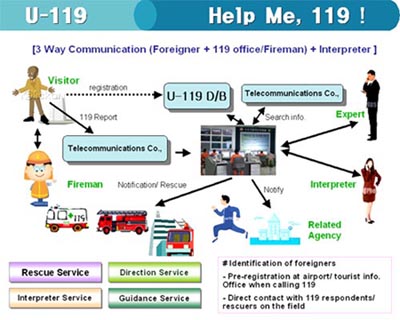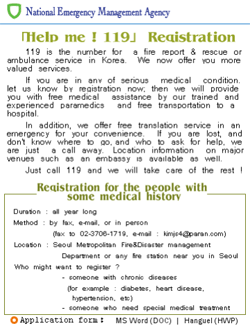 It's his first solo trip to Korea, and Tony Sharp is lost. Reaching the nearest tourist office is not quite as simple as he thought. The map he's holding is not much help either, and people are having trouble understanding him. After a few futile attempts, he's reluctant to accost more passer-bys with appeals in English.
Finally, he stumbles on a tourist information booth and learns not only how to get where he's going but how to find help whenever, wherever he needs it in Korea: The Help Me 119! Service, a free phone-based system just for foreigners feeling lost in Korea, officially kicked off this month.
The National Emergency Management Agency (NEMA) started its 119 service years ago as a way to dispatch fire fighters more efficiently. With the new and improved version of 119, Tony and those like him are instantly connected to officials with the answers to their needs via interpreters and a free three-way call. Besides English, the service is available in Japanese, Chinese, French, Spanish, Italian, Russian, German, Portuguese, Arabic, Polish, Turkish, Swedish, Thai, Vietnamese and Indonesian.
Over 300 paid professionals and volunteers are on standby to provide vital instructions at the other end of the line -- about 100 personnel from within the U-119 Emergency Center, 20 Korea Tourism Organization (KNTO) employees and 200 Before Babel Brigade (BBB) interpreters.
The BBB is a volunteer organization providing free interpretation service for both in- and outbound tourists that started up during the 2002 Korea/Japan World Cup.
The story of Tony and the foreigner-friendly 119 service was recently featured on state-run KTV. “I'd like to say 119 is extremely useful. Most importantly, 119 is a big lifesaver. Without 119, I really could have been in a serious trouble,” Sharp later said in the piece, enthusiastically plugging the number to others planning to visit Korea on business or just for fun.
The life-saving claims were no exaggeration in Janet Wilkinson's case. The U.S. expatriate used to live on the outskirts of Seoul, in Ansan, Gyeonggi-do. She was stung by a bee, a possibly fatal accident, as she is allergic to bee stings and was in a country whose language she didn't know.
Fortunately, she had pre-registered with the U-119 service, so as soon as she pressed the programmed "119 button" on her cell phone, her name, address and special healthcare needs flashed on the dispatcher's screen. Paramedics left equipped for her condition, and Janet returned to America, cured and well, three months ago.
Non-Koreans with serious medical conditions are encouraged to register with NEMA for free emergency medical care from well-equipped and trained EMS paramedics. This service is currently only available in metropolitan Seoul but is slated to cover the whole country from next year.
“We receive about 15~20 calls per month in Seoul alone for various needs; from finding a tourist spot to treating medical emergencies,” said Kim Min-sung, an National Emergency Management Agency (NEMA) official. “To further extend our service we plan to recruit more interpreters by next year.”
 All of this is part of NEMA's network-based disaster management that works in close cooperation with the public and private sectors to tailor responses to the individual needs of both Koreans and no n-Koreans. All of this is part of NEMA's network-based disaster management that works in close cooperation with the public and private sectors to tailor responses to the individual needs of both Koreans and no n-Koreans.
The government is phasing in the three main areas of service simultaneously: For emergency medical service, a wireless system will bring an ambulance to the doorstep of an elderly or disabled subscriber with the press of a single cell phone button. The emergency dispatch center already fields text messages, faxes and Web-based communication from those unable to speak; sends out helicopters for rapid organ transplants; maintains an easily accessible database with a caller's medical history; and tracks the condition of patients with serious illnesses.
For disaster response, Help Me 119! provides a conferencing service for first responders that provides important information about the disaster-struck area. The agency's U-scan system automatically defines the affected area and aids in the formulation of an adequate response.
For those lost in Seoul, a direction service is provided via a global positioning system (GPS). The agency also provides prior registration and a telematics linkage system for more adventurous explorers hiking in remote areas.
“Once we successfully establish our U-119 system, we can export the idea,” Moon Won-kyong, NEMA director, said in the KTV presentation.
In 2005 alone, there were over 1,685,000 rescue missions in which emergency personnel treated and transported over 1,165,000 people. About 7,000 calls are made per day to the 119 emergency service. So far the 119 service contains a database of about 21,000 people with serious medical conditions, over 4,000 elderly who are living alone, over 3,000 disabled people and about 55,000 foreign residents.
Foreigners wishing to register can download a U-119 application from fire.seoul.go.kr or www.nema.go.kr/eng/index.jsp. For more information, contact the U-119 Team at (02) 2100-5378 or visit www.nema.go.kr/eng/index.jsp. Registration forms are also available at the airport and tourist offices.
| The source of news : Korea.net September 28, 2006 |

